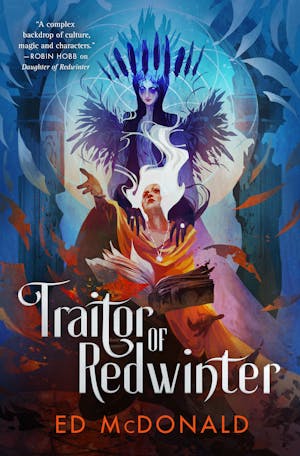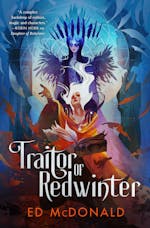1
The stories of this age begin and end with betrayal, and mine is no exception.
It was midsummer when the bodies began to fill the ditches and the flies swarmed.
‘How many, do you think?’ Castus asked. He sat high, a slender figure atop a tall horse. I’d got down in the mud; I wanted a closer look.
‘Looks like an even dozen,’ I said. Flies in the air, flies landing on my hands, flies hoping to reach my eyes. The dead were off the road, down a goat track, slumped and tangled with one another in the trench.
‘You sure you want to do that?’ Castus said. No, I wasn’t. But I needed a closer look.
I half-slid down the bank and into the ditch. It was dry, everything was dry, the grass was baked yellow and the leaves were turning crisp on the trees. It was a summer for dying things. I reached out to touch the face of one of the dead, but despite the day’s savage heat, he was cold. He’d been in his twenties. Not so old. Not old enough to die. His throat was a ruin, the blood that had cascaded down the front of his shirt was brown, and dry as the land around it. The dead man had been wearing a night shirt. The flies hummed loud, clogging the air, clogging nostrils and mouths. Poor bastards. The people, not the flies.
They had been dead long enough to reek, not long enough to rot. I should have felt a little more—“poor bastards” wasn’t much to offer them. I suppose I didn’t think of these folk so much as people, as people-who-had-been. Since I’d been a small child, I’d seen the souls of the dead. I’d risen from a death of my own, then another, first throttled, then drowned. But there were no ghosts here. Only the insects, billowing clouds of flies, and the silent, graveless bodies. Without a ghost, without a soul, it’s all just so much spoiled meat.
‘Light Above, the stench of it,’ Castus said. He put a handkerchief up against his nose, but I doubted it would do much good. On the road he’d got into some kind of pissing contest with Sanvaunt about who could see the furthest. Both men were Draoihn of the First Gate. They’d mastered the trance of Eio, and proven their dedication to the Crown. As an apprentice, I could hold the trance steadily, but I was glad not to use it now. Eio could sharpen the trance holder’s vision enough to spot a field mouse at a thousand paces, let you sense the slight twitch of a muscle that was about to uncoil. But the First Gate was so much more than that. It expanded one’s consciousness out, out, into the whole misery and glory of the world around. The bodies had been ditch-dumped a half mile from the road, and with the First Gate drumming its rhythm, Castus had inhaled that stench like a fist to the nose. He and I had broken off from the rest of the group to investigate. There was a bet on whether it was just some dead cow, mouldering in a ditch. But it wasn’t, and it was horrible, and with only the First Gate to our names, there was little we could do to change it.
Had we been able to trance beyond the Second Gate we could have turned the dead flesh to stone, or liquified it with a touch. With the Third, the Gate of Taine, we could have burned them. There was nothing that Fier, the Fourth Gate of the mind, could have done to pry into their thoughts now, and they were long past the point when the Fifth Gate of healing could have helped them. That just left Skal, the Gate of Death. The Sixth Gate. And I didn’t think they needed much help in that arena.
The sun beat down from a cloudless sky, punishing the living and dead alike.
‘Who do you think they are?’ I asked. Seven men, five women. Only the one had been dressed for bed. The others wore shirts, tunics, breeches. Nothing denoted them as being special, save the savage manner of their deaths.
‘I think they were unlucky,’ Castus said. ‘First casualties of Arrowhead’s ambition, I guess. Stop touching them, you use those hands to eat with. That corpse smell won’t wash out easy.’
I ignored Castus and laboured hard enough to roll one of them over. My suspicion was confirmed, and it didn’t sit easy.
‘Hands were tied behind their backs,’ I said. ‘Executions. Why bring them all the way out here?’
‘Well that’s not good,’ Castus said. ‘I guess Arrowhead didn’t want the townsfolk to know what he was doing? Maybe these were the town’s leaders. You’ll probably find the mayor in there somewhere.’
His assessment didn’t sit right with me. I looked up and down the ditch at the poor, dead, trussed-up people. No, they weren’t a town council. They were too young. None of them looked past thirty. They’d been helpless, slaughtered like swine, and there were rules in conflict, even for the likes of Arrowhead who was doing his best to foment unrest and was stopping short of outright rebellion against the king, and Redwinter, by a hair’s breadth.
It wasn’t war. Not yet, anyway, but it was the fronting of war, the way that two drunks square up to one another outside a bar that should have closed hours ago, that moment of posturing before the blows start to fall.
‘Can you give me a minute here in private?’ I asked.
‘If you’re thinking of taking up looting, I disapprove,’ Castus said from behind his bunched handkerchief. ‘They don’t look to have had very good taste.’
‘I just want to say a few words,’ I said, which was honest. ‘They deserve a blessing to send them on their way.’ Which was also true, but not what I intended.
‘So?’
‘So go away. It’s a private thing. You’re too full of yourself to take it seriously. You make everything seem … juvenile.’
‘Fair,’ Castus said, and turned his horse back towards the road where the rest of our ambassadorial delegation awaited our return. I waited until he was a little way off, then slowly took a deep breath. It was supposed to be calming, but I regretted it immediately. The rot in the air filled my mouth, slithered across my gums. I coughed it out and spat until I’d emptied out what I could. I watched Castus move far enough away, his attention caught by angry nesting birds calling and swooping, and then I began.
Sometimes we act on instinct. Sometimes things can be forgiven when they happen automatically, a knee-jerk reaction to something out of the ordinary. Like when I’d fed my strength into a ghost to topple Kaldhoone LacShale. I hadn’t known what I’d been doing, not really, and I’d been desperate. We forgive those things. Or we should. This, what I was about to do, I should perhaps have feared more.
People fear what they don’t understand, but this was more than that. There is a finality to death that forms a constant in our lives. People live, then they are gone. To see the dead confuses that. It makes people afraid, and the price for that is to be stoned, or hanged, or burned. Fear evokes the highest of prices for its victims. To speak with spirits or command souls is to press close to the other worlds, the Rivers of Skuttis where the damned are taken, the thin veil of the Fault that separates one reality from another, and the Night Below, where demons dwell. Sometimes I wondered whether, had I never discovered this power, I would have been the same as the rest of them.
Sanvaunt knew the truth about me, but he hadn’t turned me in for it. If our situations had been reversed, I hoped I would have been like him. I wasn’t sure I had his goodness, though. Especially in light of what I was about to attempt on these stinking bodies.
This thing I was about to do, this disrespectful, wretched thing, I’d learned from the book. Not just any book, of course. It was a book that offered words I didn’t recognise, and when I whispered them to the night they tasted like corroding metal on my tongue. They buzzed in the air, and gave it substance. They were things of history, perhaps they were part of the history of our world, but they’d given me ideas. I’d told myself I wouldn’t use them. I’d told myself I wouldn’t go back to that dark place, that I’d already stepped too far down a road I didn’t want to travel. But that’s the thing about making yourself promises. They aren’t promises at all, they’re just a way to alleviate whatever shitty thing you’re feeling at the time. We tell ourselves, “No more of that,” but that’s just helpful for a few moments. The temptation comes and we jump right back in. Drink, rose-thistle, Olatte leaf, gorging on food, it doesn’t matter. We all crumble at the first hurdle.
I checked one more time that Castus had moved far enough away before I placed my hand on the dead man with the hole in his throat. I began to say the words. I’d read them in the book, though I could never have written them down. They were ideas more than actual words, like colours you’ve never seen before. I hadn’t tried to memorise them, but they flowed like a tune. There are seven spheres to existence, radiating out from us. There is the self, and there is the other. There is energy, and there is mind. There is life, and there is death. As a whole, we say there is a seventh, which is all of creation, but that is mere philosophy. As I gave voice to my song, I traced two circles. The sixth, the encompassing one, and just one more within, occupying half the diameter, isolating the sixth sphere from the others. A Sixth Gate within a Sixth Gate. I sought knowledge from only a single dimension of existence. It was death, obviously.
I wasn’t good at this. I’d tried it before when one of the house cats died, and that hadn’t gone well. My heart was thumping away, and even if the heat of the day had made me sweat, this drew more. I spoke the words, as best as I understood them. Maybe it didn’t matter if I only got some of them right. Distantly, internally, I heard a grinding, droning sound, like the dry turning of an iron wheel, as I looked into the empty void where a spirit should have lived.
I only got a few moments. A glimpse of the young man’s last few breaths. He’d struggled at the end. Shouted, just one shout among many. A distinctive accent. And then there was a face, stark and porcelain white in front of his, so thin she could have lived through famine. And then she opened her mouth, and her teeth were jagged yellow points. Most of his last moments were fear, and terrible pain, but he thought of a woman before he died. Resentment that he’d not get a chance to live out his life with her. And that was it. Done.
I shuddered, fell backwards against the ditch wall, found my breath coming fast and hard. I’d only had an image of that face, that dreadful, pale-eyed face, but it had been enough. Human? I thought so, though there were things that walked in human guise. But to drag these people out here had taken more than just one sharp-toothed thing. For a moment I had the impression of blood in my mouth. I spat, but it was only my imagination.
Copyright © 2023 by ECM Creative, Ltd.






